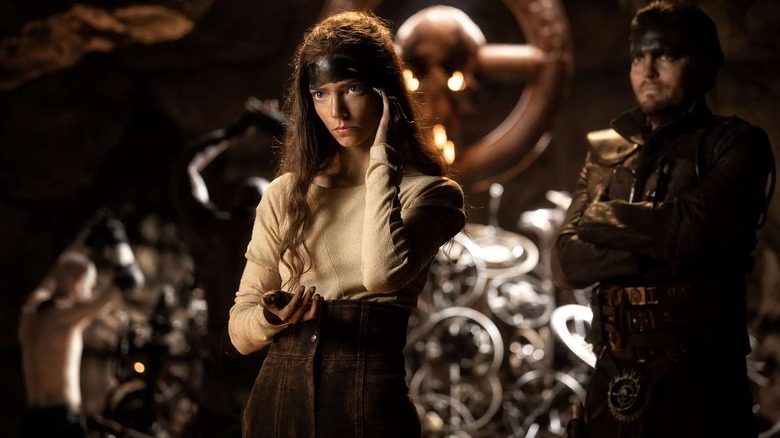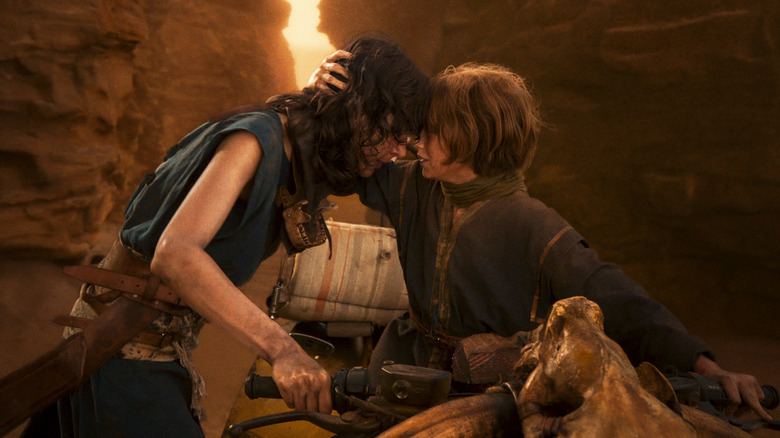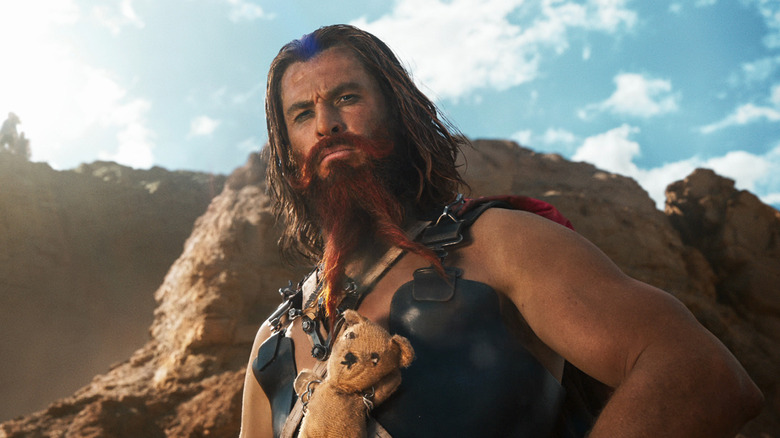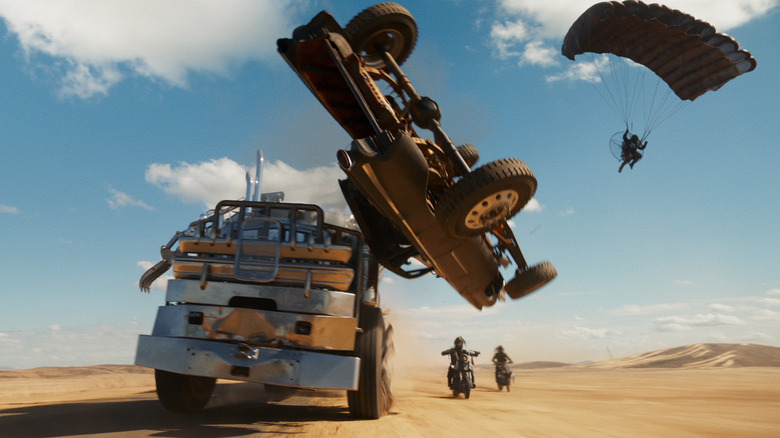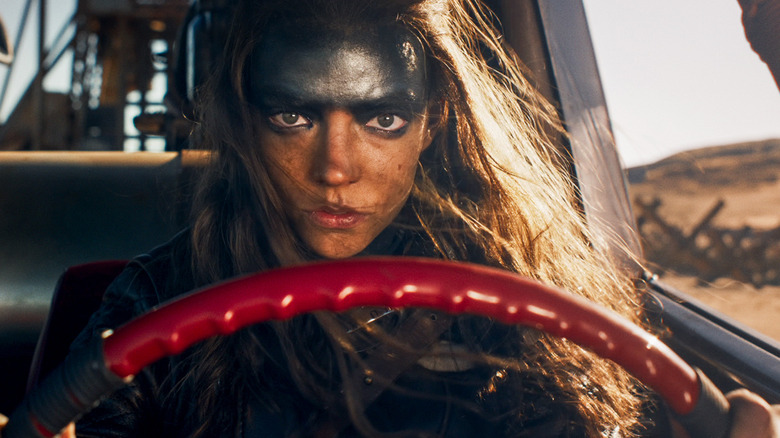Furiosa Director George Miller Thinks We Can Still Avoid Our Own Mad Max Apocalypse [Exclusive Interview]
At this point in his 40+ year career, it can be said that filmmaker George Miller is a mythmaker. Despite his cinematic range, which spans brutal, violent live-action movies to family-friendly animated fare, all of his works have a spark of myth about them, whether he's dealing with women experimenting with the occult (as in "The Witches of Eastwick") or anthropomorphized animals venturing beyond their comfort zones (as in "Babe" and "Happy Feet").
Of course, Miller's magnum opus is what has now been officially dubbed the "Mad Max" saga, a series of films that has spanned the entire breadth of Miller's career to date. The fifth in the saga, "Furiosa," is in theaters now, and it's a picture that should silence anyone who still refers to these films as merely action movies. Unlike the previous "Mad Max" film, 2015's "Fury Road" (which "Furiosa" is a prequel to), this movie is a sprawling saga that follows Furiosa (Alyla Browne and Anya Taylor-Joy) through decades of her struggle to survive within a post-apocalyptic wasteland, all as she plots to get revenge on an insidious warlord known as Dementus (Chris Hemsworth).
With its frames of reference spanning not just cinema but literature, religion, and the mythologies of various cultures, "Furiosa" is all at once a character study, a revenge thriller, a tragedy, and an aspirational myth unto itself; in other words, this is far more than your average IP-milking prequel. I had the distinct honor of speaking with Mr. Miller recently, and found the man to be as philosophical, generous, and thoughtful as his films seem to indicate. During our surprisingly emotional conversation about craft, storytelling, and the history of myth, Miller proved several times over what a special and timeless artist he is.
Note: This interview has been lightly edited for clarity and brevity.
How Three Thousand Years of Longing connects to Furiosa
I wanted to start by asking you about your opinions on myth-making, because I know that you and writer Terry Hayes worked on "Mad Max 2" to create a myth out of that movie while you were making it. And you made a wonderful film, "Three Thousand Years of Longing," just before "Furiosa." Did making that film inform the making of "Furiosa" at all? Because I know "Furiosa" was nearly finished as a script even before "Fury Road."
Well, that film, "Three Thousand Years of Longing," was based on a wonderful short story by A.S. Byatt, who was not only a great author, but she was a great scholar. And she really studied story really well. She was a literary figure, but she was mainly interested in narrative and the way it operated. Without using up too much time: At the turn of the millennium, I remember the New York Times asked several people to write on human endeavors, and someone wrote on music, someone wrote on, I don't know, sport or whatever, but she wrote on literature, on story. And the piece she wrote for the New York Times was on the best stories. It was called "Narrate or Die." And it was [about] the best stories told across the previous millennium.
She basically put forward that the greatest stories told were the Arabian Nights, because they evolved over many cultures over probably close to a thousand years, all the way down from China, right down to the end of Spain on the, I guess, the Silk Road. Anyway, she wrote a wonderful piece on that, the function of stories in our world. And I got really involved in that when we did "Three Thousand Years of Longing." Other than Joseph Campbell, she, I think, is the one who really, really understood why we tell stories, why somehow we are hardwired for stories, and why somehow stories, according to their time, are a way for us to basically find the signal in the noise, if you like. And I'm really coming to that understanding in our work. What I really like about working in the "Mad Max" world is that they're very much, they're allegorical in the same way that, say, the American Westerns basically are allegorical. So here I am. We have just finished one.
George Miller on working with actors to create larger-than-life characters
When you create a script like "Furiosa" and you hand it over to the actors, is your collaboration with them more about, "We've done so much prep work on the design, and the mythology, and the look of these characters, so let's see you interpret it"? Or is it a collaboration? Do they bring more to it than necessarily just filling a role?
Oh yes. I mean, that's what you hope. It's in the preparation. I guess the best analogy, if you've got a sporting team, so say a basketball team, first of all, the athlete, they have an innate skill: That's their genetics. They basically are training from very early ages and they're really honing those skills. And if they reach the highest level of it, they really, really are kind of very primed in every way. Then they start working in teams, and teamwork in acting is really important. We are much more interested in what characters are doing to each other rather than what one character just does, or one actor just does, if you like.
And it comes to the moment of performance, and all the preparation, all the drilling, all the innate skills, all the work that goes into that, which is a combination of cerebral and just drilling and practice and so on, all of that finally is surrendered and put aside, and they hand it over to the instinctive, intuitive response in the moment of performance. And you don't know what's going to come out because it's not something that's predetermined. I mean, there's basic blocking and stuff like that. When you get it and when you have the camera there in the right position to capture that, that's wonderful. That's what you're trying to do all the time in cinema.
And I must say with Anya and with Chris and the way they work together, and indeed the whole cast, I was so happy because they were kind of working optimally in that way. Prepared well. My job was to make sure that they had everything they needed, that they understood everything, that their circumstance of the shooting was conducive and relaxed enough for them to give it their best. And they did. It was really a wonderful thing for me.
How a deleted element from Fury Road led to the parasailing bombers in Furiosa
Other than the characters and the story of the "Mad Max" saga, one of its iconic elements is its vehicles. I know for "Fury Road" you found the Pole Cats through Cirque du Soleil, partly. Where did you find the windsurfing bomber folks in this movie? Where did they come from?
In "Fury Road," we had a scene at night where there was somebody — there was a scene, a very brief scene where someone was seen flying around on some sort of parasail sailing thing. It was storyboarded. But when we came to shooting it, or even long before we were going to shoot it, we thought, "It's unnecessary." But the idea was there. And I remember when we started to ... we didn't write it exactly that way in the first draft, but I remember Guy Norris — with whom I've been working for something like 41 years, one way or another, as a young stuntman on "Road Warrior" and all the way [to now] — I remember he said, as we were devising the sequence, he said, "How about we go back to these flying people in the air so we're not only shooting underneath the war rig, or inside the cabin of the war rig, or on top of it or the back of it, but let's have it attack from above, rather than the Pole Cats." So that's how we started on that sequence.
Miller's thoughts on hope, from the Mad Max universe to ours
One of the major themes of "Furiosa" is this ideological clash between Furiosa and Dementus, of whether there is hope or not in this wasteland. And I personally feel that "Fury Road" is such a wonderful reflection of where we were culturally in 2015 and now this movie for 2024. Where do you come down on that philosophical question? Not to get too big, but do you think we have hope?
Do we have hope? Yeah, definitely. Look, it's contradictory. There's despair and hope, and the two go hand in hand. Hope grows out of despair and it keeps people going forward. Hope can be thwarted, but look: Every time, in every era, there are apocalyptic times. I mean, it is part of our nature, and there are things to be very concerned about, but there's always been things to be concerned about. We're at a time where people are saying, "Oh, these are dark times." But if you go back in history, I mean, my parents were lucky enough to live through the 20th century. They were both born early 20th century and [lived] into this century as well. And what they went through, there were two world wars, a depression, there was a Cold War, there was the Vietnam War and all of that sort of stuff. Much, much tougher. It wasn't tougher than it is today, but it was always sort of tough and it was always that sort of balance between hope and despair that's with us all. It's who we are as human beings, and what we have to deal with.
Well, your films give me hope. Thank you so much for the film, and thank you for talking to me today. It's been such a pleasure.
Yeah. I hope it made sense.
Oh, it makes total sense. Thank you again.
You too, for listening.
"Furiosa: A Mad Max Saga" is playing in theaters everywhere.
